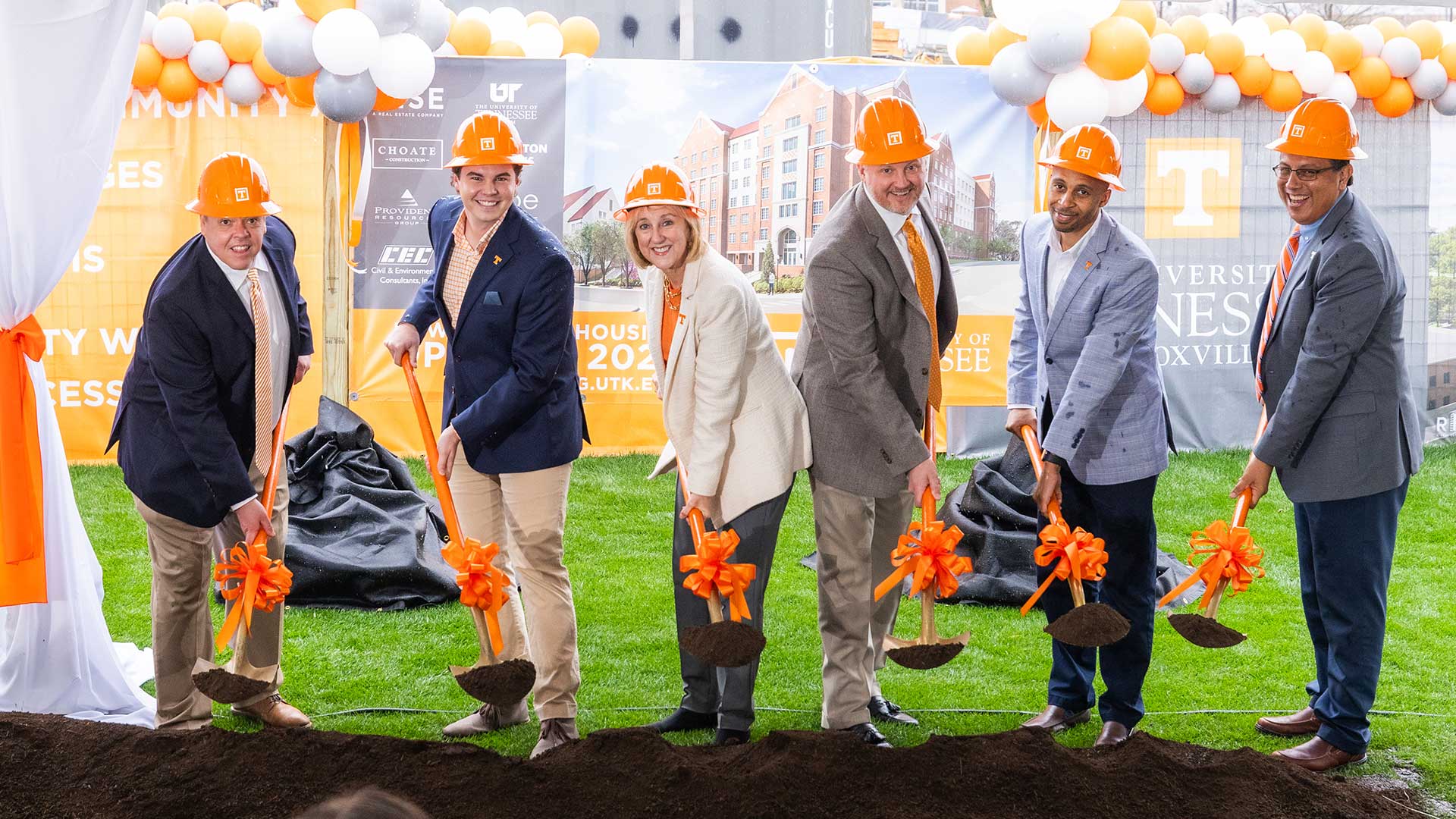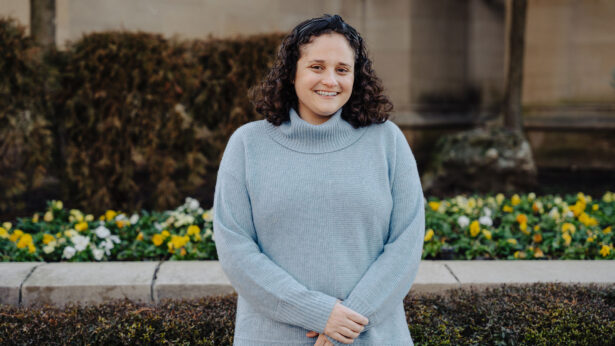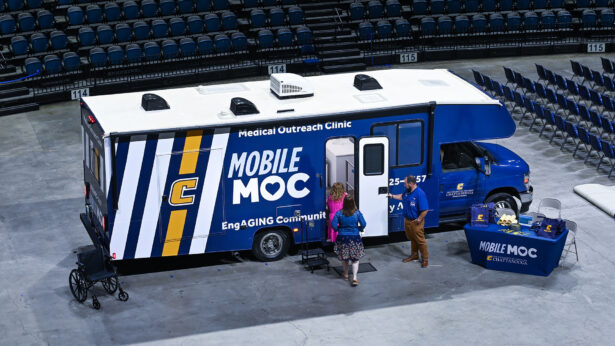From building infrastructure to supporting academics and research, the University of Tennessee, Knoxville, is creating capacity on campus to accommodate growth, spark innovation and deliver the Volunteer experience. Increased interest from prospective students and a record percentage of first-year students returning for their sophomore year—91 percent in fall 2023—have allowed the university to keep investing in its campus.
“To meet our vision of educating more Tennesseans and building the state’s future workforce, we must invest in our campus,” says Chancellor Donde Plowman. “That means both building more capacity and creating the kind of dynamic and supportive learning environment that will help our students succeed.”
New Residential Communities
Construction is underway on two new residential communities that will add about 1,950 beds to university housing, which currently has about 8,500 beds. The residence halls are being built through a public-private partnership and are expected to open for the fall 2025 semester. The project will allow the university to more quickly meet the increased need for student housing due to growing enrollment and more students seeking to stay on campus longer.
The first phase of the project includes developments at two sites. The first, at the intersection of Andy Holt Avenue and 20th Street, will feature a residence hall with about 788 beds. The second, a two-building housing community with approximately 1,166 beds, will be built between Caledonia and Terrace avenues.
Phase 2 of the initial public-private partnership project, subject to appropriate approvals, will include a residential community at the intersection of Lake Loudoun and Volunteer boulevards.
Expanding physical Capacity
A new student-success building will be constructed in the footprint of Melrose Hall and is expected to open in 2027. The physical space will help the Division of Student Success continue its work to retain a talented and diverse student body, connecting students with resources to be successful in and out of the classroom and preparing them for the workforce. The building also will house Student Disability Services, five classrooms and other academic and event spaces.
Renovations are underway at the Frieson Black Cultural Center, which houses Multicultural Student Life. The university also will be moving forward, pending state approval, to expand the center.
Planning for renovation of the Presidential Courtyard Building will begin in late summer 2024. The renovated building will include new offices for the Division of Student Life, a basic needs center, a mail and packaging center for residential students, and meeting spaces.
The four-story Croley Nursing Building at the corner of Volunteer Boulevard and Peyton Manning Pass is under construction and on track to open in fall 2025. The new building will allow the college to increase enrollment significantly, which will help train more nurses and address the nationwide nursing shortage.
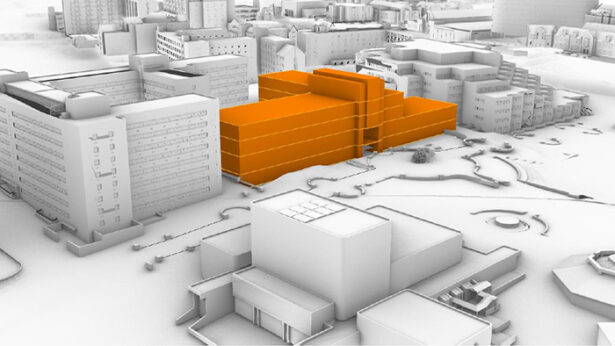
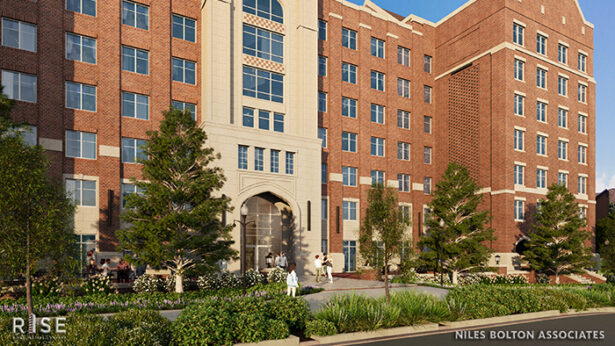
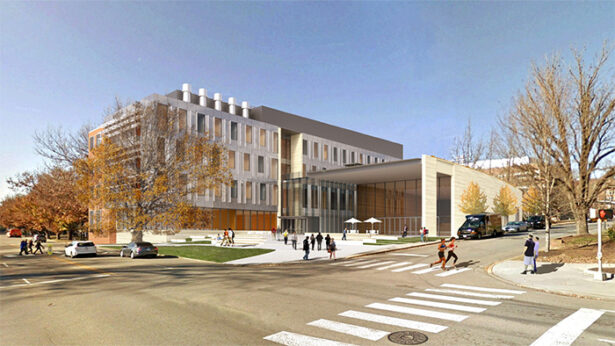
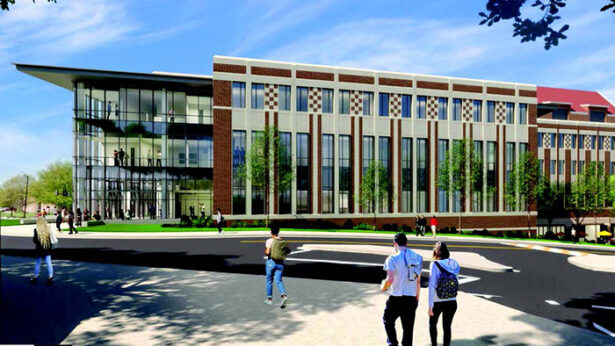
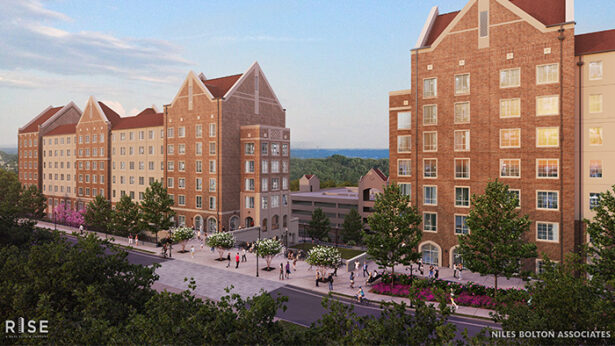

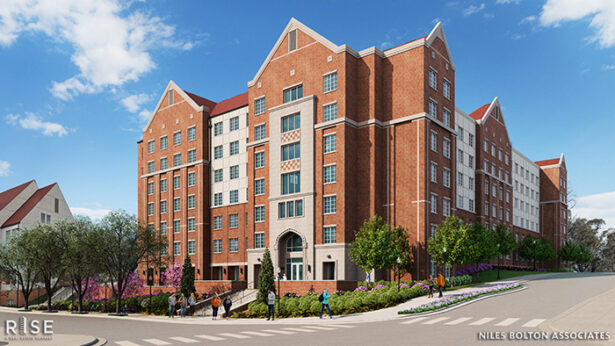
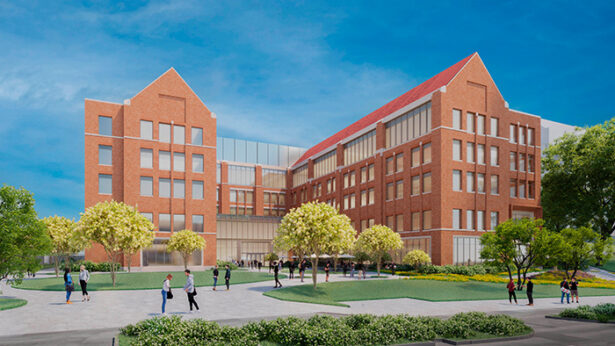
CLICK TO EXPAND IMAGES
A new building to expand the Haslam College of Business is expected to open in fall 2027. The state-of-the-art facility will serve as a model to promote collaboration, attract top talent and address the continued growth in the college’s nationally ranked programs. Demolition work to prepare the site for construction is underway.
The university has received permission to self fund the first stages of design for a new chemistry building and is working to secure state appropriations for the project to move forward.
Planning is underway for an interdisciplinary classroom and humanities building on Volunteer Boulevard along the south end of the Humanities and Social Sciences Building and east of the Art and Architecture Building.
The Agriculture and Natural Resources Building on the UT Institute of Agriculture campus will open for classes in the fall 2024 semester. The five-story building includes 25 labs, 11 classrooms, a 500-seat auditorium and a green roof that will also be a learning lab maintained by UTIA students.
Research and Innovation
The university is modernizing how it brings faculty and students together with industry to accelerate innovation and discovery.
Construction at the Innovation South building at the UT Research Park at Cherokee Farm is expected to finish in October 2024. UTK will lease about 39,000 square feet for the new expanded home of the Fibers and Composites Manufacturing Facility and other materials-based research.
Other tenants will include the new headquarters for IACMI—The Composites Institute, a 130-plus-member consortium of companies largely focused on the composites manufacturing sector. IACMI is an acronym for Institute for Advanced Composites Manufacturing Innovation. The expanded facility will provide a front door for industry partners to collaborate with UTK faculty and students to quickly turn advanced materials and manufacturing research into new products that strengthen and grow Tennessee’s innovation economy.
A state-of-the-art simulation and learning lab at the UT Research Park supports the Nursing Scholars Program, a partnership between the College of Nursing and UT Medical Center that opened in fall 2023. The program expands access to education and meets industry and workforce needs.
Academic Units and Programs
The university’s three new academic units, launched in July 2023, are expanding opportunities for students and helping serve the state of Tennessee and beyond. The elevation of the College of Music raises its profile and allows it to create innovative courses, curricula and degree programs.
The first-of-its-kind College of Emerging and Collaborative Studies acts as an incubator and home for new degree programs on emerging topics that are rapidly changing the future landscape of the workforce.
The Howard H. Baker Jr. School of Public Policy and Public Affairs grew out of the Howard H. Baker Jr. Center for Public Policy to educate and promote research to further the public’s knowledge of our system of governance and highlight the critical importance of public service. The new school, which includes the Institute of American Civics, is taking that mission even further by creating academic programs and degrees that will help produce public servants and civic leaders.
The College of Arts and Sciences and the Tickle College of Engineering, in collaboration with the Office of the Provost and the Division of Student Success, piloted a new Academic Course Community initiative in fall 2023. About 400 first-year students were enrolled together in several courses relevant to their degree programs.
The courses were held outside of peak class times on campus, which allowed for specialized academic support tied to those classes—for example, an exam review session held immediately following class. Students also had access to success workshops, academic coaching and peer learning assistance. The Office of the Provost and Division of Student Success are working to continue this initiative for fall 2024.
Parking and Transportation
UTK is implementing several initiatives to address parking needs on campus. The changes will help improve the parking experience by making it faster and easier to find a parking space.
Starting in fall 2024, the university is adding 1,000 flexible parking spaces for students, employees, alumni and visitors who need short-term parking on campus. The hourly, mobile-pay spaces allow for accessible parking without having to use a spot designated for permit holders.
Students will be able to purchase parking permits in zone areas based on availability and a tiered system that prioritizes academic credit hours earned. Preference will be given to upper-level students, with graduate students and seniors choosing parking options first.
Additional improvements include expanded T bus services with faster routes and better connections across campus. The university will add eight buses for the 2024–25 academic year to help reduce wait times, including five all-electric buses, bringing the total number of buses in the university’s fleet to 31.
The university’s commitment to expanding access includes creating capacity on campus to deliver the best Volunteer experience for all students in residential experience, student life, the classroom and beyond.
